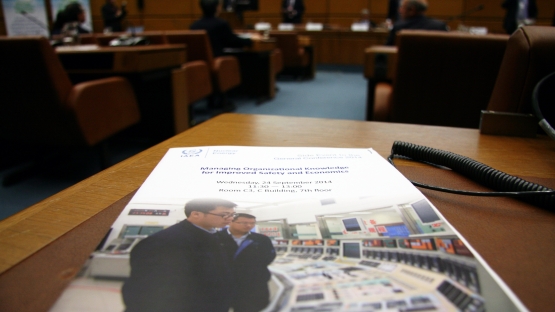Nuclear knowledge is a critical resource and asset that needs to be managed carefully, participants at a recent event during the IAEA 58th General Conference heard.
"Both newcomers as well as operating countries face the challenge of developing or maintaining sufficient levels of nuclear knowledge experience and expertise," said IAEA Deputy Director General and Head of the Department of Nuclear Energy, Alexander Bychkov.
The side event on Managing Organizational Knowledge for Improved Safety and Economics, held on 24 September 2014, was based on the premise that the nuclear power sector highly relies on science for effective operation of a nuclear facility - assuring safe, efficient and sustainable electricity generation. This scientific base strongly depends on knowledge processes, accessibility, and the training of competent facility staff.
At the same time, the design, technical support and licensing of a nuclear power operation, require knowledge management efforts both from within individual organizations and at the national and international levels. Hence, presentations at the event reflected different types of nuclear organizations, each with a focus on different knowledge management practices and tools.
Takuya Hattori of the Japan Nuclear Human Resource Development Network (JN-HRD), described Japan's greatest nuclear challenges: the retirement of expert staff, the current trend of students shying away from nuclear engineering and science, the decommissioning of the Fukushima Daiichi reactors, and the safe operation of aged nuclear power plants. He explained how JN-HRD hopes to address these issues through greater collaboration with the government, national industries and institutions, and with global organizations such as the IAEA.
Two speakers from France, Michel Debes and Serge Runge, spoke about knowledge management strategies of Electricité de France (EDF) and Areva. "As the size of a project increases, both in physical size and age, so does its human resource challenge," Mr Runge said. "And as this challenge increases, so does the need for sustainable collaborations." He also highlighted AREVA's efforts to collaborate with universities across the world. Mr Debes, meanwhile, spoke about EDF's efforts to prepare for basic knowledge in life cycle management and added that a reassessment process of safety series was conducted every decade.
ROSATOM's Deputy Director of Innovation Management, Alexander Tuzov, emphasized that nuclear knowledge generated value that spilled over into other sectors of the economy. He described ROSATOM's ambitions to digitalize and organize its knowledge, and to create intellectual property.
John Loy, Deputy Director General of the Federal Authority for Nuclear Regulation (FANR) of the United Arab Emirates, discussed how the culture of the nuclear industry needed to change with regards to knowledge management, as it was not effective to pass knowledge by "osmosis". He described FANR's challenge in transferring knowledge from experienced and skilled expats to a young generation of Emiratis.
Head of the IAEA Nuclear Knowledge Management Section, John de Grosbois, described the general challenges of knowledge management in the nuclear industry, primarily its complex technology base, its long life-cycle, its regulation structures, and the lack of understanding in knowledge management issues. He drove home the message that a lack of knowledge management would lead to indecision and could ultimately lead to bad decisions.
A dynamic question and answer session revealed that knowledge management issues were familiar and high on the agenda for a broad range of countries.


